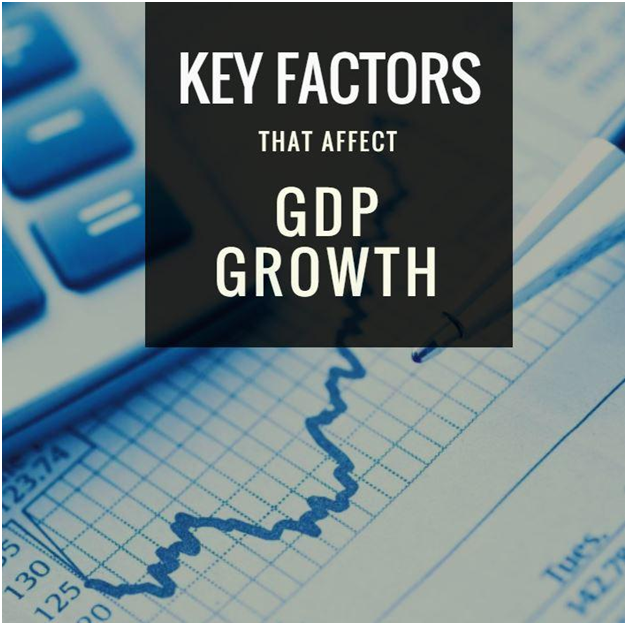The Gross Domestic Product of any country is measured by the level of productivity witnessed within a year. This productivity is expressed in terms of economic output. There are many different participants in an economy who are involved in either production or consumption and they are all considered when the GDP is being computed. Being the measure of a country’s economic output, the GDP is analyzed in terms of all new products that were either created or purchased in that year.
 The GDP is an all-encompassing measure which gives an overview of the health of the economy. All the markets in the economy including the currency exchange market, the services market and the industries are thus generally represented in any given GDP figure. The increase in the total output in an economy is referred to as GDP growth. There are many things in an economy which affect GDP growth. Here are some of the key factors that influence GDP growth.
The GDP is an all-encompassing measure which gives an overview of the health of the economy. All the markets in the economy including the currency exchange market, the services market and the industries are thus generally represented in any given GDP figure. The increase in the total output in an economy is referred to as GDP growth. There are many things in an economy which affect GDP growth. Here are some of the key factors that influence GDP growth.
1. Technology and capital
One of the most important factors that contribute to GDP growth in the modern day is technology. Almost every industry relies on technology to achieve efficiency and top-tier performance. Technology is a critical link in the chain of production that allows raw materials to be converted into finished goods. Technology is also a catalyst for productivity. Technology is present in all sectors of the economy including the service industry. Technology has evolved tremendously since the early days of simple tools. Modern tools are very efficient in saving time and producing great amounts of output. Capital basically includes all inputs of production including technology itself. Technology is essential in converting raw materials to finished products. As reported by Admiral Markets, finished products are of a higher value and attract more income than raw products. GDP growth is thus heavily reliant on technology in any given economy.
2. Labor
Labor is also commonly referred to as human resources. Human resources are the engine of the economy. Every aspect of production relies on the input of people who serve as the primary resource for production. People are involved in many kinds of industries. In a given economy, the human resource needs to be skilled enough in order to contribute to the growth of GDP. Economies that have invested in education usually experience high levels of GDP growth because the people are able to apply their skills in technical and scientific fields. Since technology is a key factor in the growth of an economy, a skilled labor force that is capable of employing the different forms of technology in production will definitely produce better results than an unskilled population.
3. Natural resources
The third factor that affects GDP growth is natural resources. Natural resources like minerals, land, water, plants, and animals are all very crucial for the growth of the economy. The natural resources of a particular country are a part of its natural wealth. Countries that are endowed with natural resources are thus at a greater advantage when it comes to growing the GDP. In order for GDP to grow, natural resources need to be harvested and used as part of production or as final goods. Most natural resources go through a process of value addition before they can be counted as part of the GDP. A country that has many resources only needs to develop appropriate methods of managing and exploiting the natural resources in order to achieve economic growth. Some natural resources are perishable while others are renewable. Developing suitable means of taking care of natural resources can secure a sustainable GDP growth for a country.
4. Political and social factors
 Finally, social and political factors are critical to the GDP growth of a country. Economies can either be dysfunctional or productive depending on how the political affairs are managed. Politics plays a central role in the growth of a country because the leadership role is held at the political level. Leaders come up with policies and regulations that govern how resources are exploited and managed in an economy. If the political leaders are not visionary, even the wealthiest country is unlikely to experience any GDP growth. Social factors like local culture are also very important in determining how fast the economy grows or whether the economy grows at all. Social factors like customs, traditions, and beliefs can either encourage or prohibit the exploitation of resources or the formulation of laws that govern the exploitation of resources.
Finally, social and political factors are critical to the GDP growth of a country. Economies can either be dysfunctional or productive depending on how the political affairs are managed. Politics plays a central role in the growth of a country because the leadership role is held at the political level. Leaders come up with policies and regulations that govern how resources are exploited and managed in an economy. If the political leaders are not visionary, even the wealthiest country is unlikely to experience any GDP growth. Social factors like local culture are also very important in determining how fast the economy grows or whether the economy grows at all. Social factors like customs, traditions, and beliefs can either encourage or prohibit the exploitation of resources or the formulation of laws that govern the exploitation of resources.

Leave a Reply